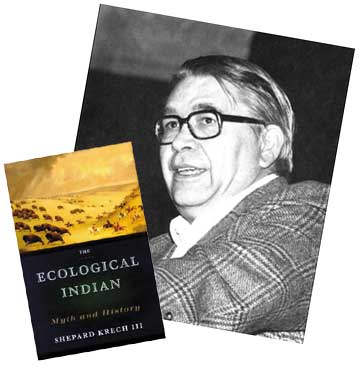|
|
||
Vine Deloria Jr.s' Reaction to Sheppard Kroch's Book The Ecological Indian According to Vine Deloria, Jr., noted Standing Rock Sioux author, "Academic success today is highly dependent on publicity and novelties rather than solid scholarship." Deloria believes proof of this statement is exemplified in Sheppard Krech’s book The Ecological Indian. In the beginning, Krech asks the simple question, "What does it mean to say Indians are ecologists?" He argues that "because they are the most consistent attributes of the image of the Ecological Indian, the concepts should be defined with care." But the author goes on for another hundred pages or so before he gives his definition of ecology. According to Krech, we are caught between "those who think that Indians were somehow nontechnological or pretechnological, had no impact on the environment, and were therefore ‘natural,’ and those who disagree."journey they would be automatically disqualified as ecologists. Were Indians conservationists? Not according to Krech. Deloria states that the evidence Krech offers is hardly convincing. Citing an obscure site in Southern Colorado, Krech explains his indictment: "Olsen-Chubbuck records a single episode that took place eight millennia ago, when hunters drove a herd of bison (of a species one-third larger than today’s) over a bank or a dry gulch where almost two hundred, a mixed group of adults and juveniles, cows and bulls perished." Two hundred animals out of perhaps 30 million or so does not seem excessive to Deloria, but to modern conservationists, it certainly seems criminal. Deloria states this evidence is cited to prove the immoral practices of modern Indians because Krech concludes: "Indians who hunted buffaloes at Olsen-Chubbuck evidently had as little interest in conservationists as did the many Indians using communal hunting sites in the eighteenth and nineteenth centuries." For Deloria, this is an excessively far reach to indict or convict. He notes that if we apply this type of logic with equal vigor we can reach equally startling conclusions. "Since the English put many people to death using swords, it should be clear, according to Krech's logic, that Queen Elizabeth II should have been tried for the murders instead of O.J. Simpson," explains Deloria. Deloria wonders if any of the excited, glowing reviewers of Krech’s book actually read any of the text. He states he was prepared for a "brilliant tour d’force giving us a real inside view of Indians and the environment." Instead he found, "a badly confused arrangement of anecdotal evidence clustered around several topics: big game hunters, extermination of the buffalo, ill use of agricultural lands, mysteries at Chaco Canyon and the use of fire." Although this book has been applauded coast-to-coast as a major step forward in ecological history, Deloria finds neither the evidence nor the arguments Krech presents to be convincing. He concludes his review of the book with a research proposition. Noticing, in an unscientific survey, that an amazing number of western historians, anthropologists, and archaeologists were originally attracted to their fields by childhood experiences in the Boy Scouts and YMCA Indian guides, Deloria believes career decisions were made based on the teachings of these programs providing lessons such as "Indians walked single file through the woods without making a sound, etc." Deloria feels that when these people actually had the opportunity to meet Indians, this image faded. They became bitter because modern Indians don’t walk around in pure white buckskins spouting aphorisms. Deloria has noticed that many of these people cannot stand the tensions created by the collapse of their childhood fantasies so they become loose cannons liable to explode with "anti-Indian sentiments at any time." A good many others decide to replace Indians with new heroes, ecologists, shamans, and so forth. Their only means of hanging on to their childhood dreams is becoming Indians themselves and to do that, they must "bring discredit of any benign image of Indians that may be accepted at the moment." Deloria predicts we will see more of these "wretched Kreched efforts" to attack the Indian symbols in the future. Meanwhile, I suggest, and I am sure Deloria would agree, ALWAYS consider the source of information written about Indians. Search deeper than academic success. In other words, research the researcher, then form your own opinion. Just because it is book written by an academic doesn’t mean it is the almighty researched and proven truth. MariJo Moore, Cherokee, is the author of "Spirit Voices of Bones" & "Red Woman With Backward Eyes". She may be reached at PO Box 2493 Candler, NC 28715 or email MARIJOM@aol.com MariJo Moore |
||
|
|
||
